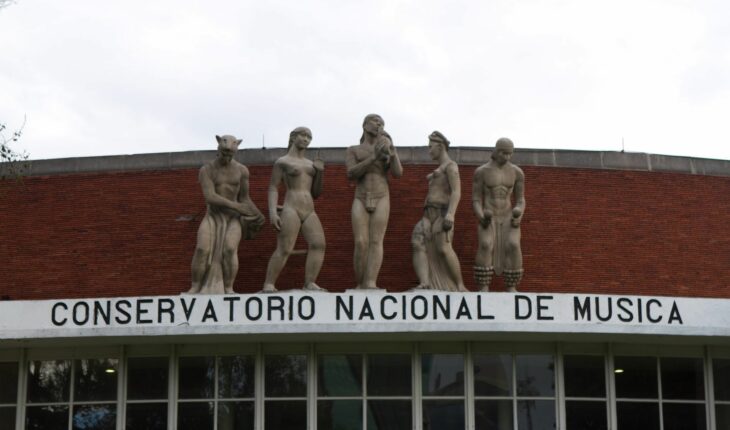After students of the National Conservatory of Music (CNM) protested alleged acts of sexual violence committed by the newly appointed director, Patricio Méndez Garrido, the National Institute of Fine Arts and Literature (INBAL) reported that it has initiated dialogue tables with the school community, but has not investigated the complaints.
This, according to the Institute, because “it has not formally received any of the complaints expressed.”
Two days before INBAL pronounced itself for the first time on the issue, the collective Unidas CNM, in charge of organizing the clothesline of complaints inside the school on August 15, made public on social networks a report made by the student community based on the testimonies collected in the protest.
They also published a letter addressed to the Deputy Director General of Artistic Education and Research, Mónica Hernández, requesting that the accusations be investigated and that there be transparency of the processes against the alleged aggressors.
This report details that there were 32 complaints that were received against the now director and four teachers, on August 12, for behaviors such as sexual abuse, discrimination, verbal aggression, digital violence, psychological abuse and abuse of power.
Most of them pointed to Méndez Garrido as the alleged aggressor.
Harassment at the Conservatory
According to the report prepared by Unidas CMN, 63% of the complaints for various violent behaviors were made by women, 16% by men and in 21% of the cases the sex of the people affected was not specified.
As for the alleged aggressors, 23% were identified as students, 8% as former students and 69% as teachers.
Among the accusations made against the director, which correspond to 34% of those made on the clothesline, are the following:
“I learned from other students that the teacher had sex inside the classrooms.”
“He had communication with this man via SMS messages, and he behaved like an immature man who seeks to conquer a girl in the most crude way.”
“In the classroom he humiliates the students, discriminates against them and always tells them very hurtful things, such as that they are not useful for this career.”
Another of the teachers, identified as R.M, was singled out for acts such as compliments or unsolicited comments about the physical appearance of the students, calls and messages of a non-consensual sex-affective nature, as well as negative effects on the school situation of the students who did not accept their invitations and proposals.
In addition, a professor identified as R.R. was denounced for psychological abuse, and one more, V.B., was accused of committing digital violence because he allegedly sent unsolicited intimate photographs to students, and told other people “holy and sign of what he did intimately with each one.”
The only teacher denounced, A.T., was accused of exercising psychological violence, telling her students “that it was a shame as a musician, that I canceled my presentation and that if I did not put that she was my teacher because she was ashamed”, among other comments that caused “fear and even belly pain”.
In response to the protest of the clothesline of complaints, INBAL said that it has established “a dialogue, permanent” with those involved.
“Derived from these actions, INBAL offered permanent dialogue tables, in which the Deputy Director General of Artistic Education and Research, Mónica Hernández Riquelme, and the President of the Ethics Committee and Deputy Director General of Administration, Pedro Fuentes Burgos, received each of these sectors and their positions were heard, in an open and transparent manner, inviting them to make the corresponding complaints in the instances that are institutionally available,” the Institute said in a statement.
Regarding the appointment of the director, the officials met with a commission of students to explain the selection process, where “it was indicated that she fulfilled all the stages indicated so that the general director had the most information to make use of her regulatory powers and designate one of the candidates.”
“In addition, emphasis was placed on the spaces that were generated during the process for the educational community to express itself on the candidacies presented. In this sense, the secretary of the Ethics Committee offered them advice and accompaniment so that their writings entered this instance complying with the necessary characteristics and could proceed to their attention. To date, the Ethics Committee has not received any,” he added.
He also indicated that there was a meeting with teachers, on August 23, where they expressed the need for research.The response was the same: “Hernández Riquelme and Fuentes Burgos described the procedures for the alleged accusations made.”
This Monday, the INBAL authorities will meet again with the CMN community to review the entry of the indicated writings.
Aggressions are normalized
In conclusion to its first report of testimonies collected, Unidas CNM said that some of these aggressions have been normalized under the authority that some members support over others, and in some cases, because they are taken as “trust between friends.”
“The culture of denunciation is not normalized within the institution. According to their survey, the main reasons why whistleblowers have not gone to institutional areas to formalize accusations are fear of consequences or threats, or because they do not want to be perceived as “negative” or revictimized.
They also indicated that they fear that by presenting the complaints they give more weight to the word of the aggressors than to the victims, the lack of evidence because they are behaviors committed without witnesses, as well as the ignorance among the student community about the means to present the complaints.
For Unidas CNM, “even with the consideration of the presumption of innocence of the accused, it is necessary to raise awareness of the testimonies, establishing mechanisms that favor the eradication of violence within the Conservatory. There is an urgent need to promote and disseminate in the community that harassment and sexual harassment are crimes, and to design programs that provide comprehensive re-educational services for victims and aggressors.”
“These testimonies cannot be dismissed. This forces us to reflect on the practices within the school and to commit ourselves to a continuous process of self-criticism, and not only to identify and incriminate individuals, but also to eradicate the conditions that support the acts perpetrated by them,” the collective demanded.
What we do at Animal Político requires professional journalists, teamwork, dialogue with readers and something very important: independence. You can help us keep going. Be part of the team.
Subscribe to Animal Político, receive benefits and support free journalism.#YoSoyAnimal





